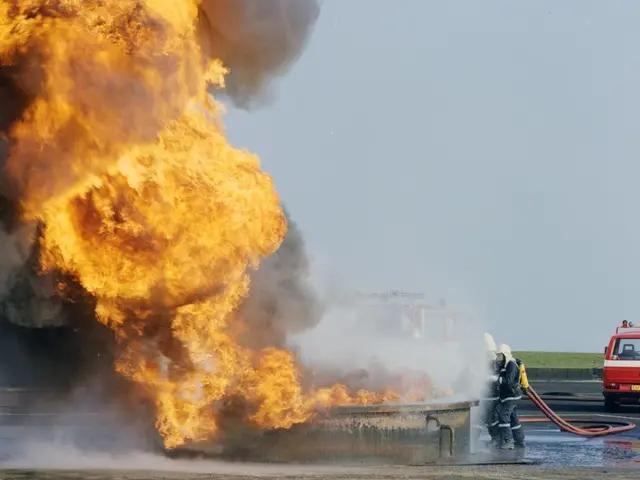Navigating Stormy Waters: Shipbuilding Industry Stumbles Amidst Challenges
The latest survey conducted by the Chambers of Industry and Commerce reveals a gloomy sentiment in Germany's shipbuilding sector. Economic prospects have taken a significant hit, as demonstrated by the decline in the business climate index within the shipping industry. However, the port industry remains somewhat hopeful, displaying a minor positive trend.
In these challenging times, Klaus-Jürgen Strupp, Chairman of IHK Nord, emphasized that the green transition in the maritime industry necessitates both regulatory and ongoing financial support from the federal government. The ecosystem's well-being hinges upon a robust domestic shipping industry's growth.
Rising Concerns in the Shipping Industry
Business leaders are especially apprehensive about escalating raw material and energy prices, unpredictable economic conditions, skills shortages, and labor costs. The economic barometer for the shipbuilding sector showed the steepest decline, sliding from 63.1 points to 55.2 points. Despite the trials, none of the assessed companies anticipated improved circumstances in the coming months.
Persisting Challenges and Potential Solutions
Although the German shipbuilding industry grapples with numerous hurdles, essential investments in innovative shipbuilding technology are essential to boost competitiveness. The sector's shift to environmentally friendly energy sources, obligated by both fiscal and regulatory requirements, necessitates governmental backing to overcome the financial strain posed by mounting raw material and energy expenses.
Exploring Alternatives and Strategic Approaches
The maritime industry, in pursuit of greener power sources, is actively seeking regulatory and financial support from the government to cope with budgetary constraints. European cooperation, green financing, technological innovations, the adoption of alternative fuels, infrastructure development, regulatory framework, and cybersecurity measures are instrumental in bridging the gap between environmental stewardship and industrial competitiveness.
Collaborative Initiatives
Greater union within Europe, fostering reconciliation between industrial emissions reductions and competitiveness, is vital for reshaping industrial value chains to seize renewable energy price advantages. Collaborative practices will help German industries weather the economic storm and maintain their reputations as leaders in innovation and sustainability.
Green Financing Opportunities
Lenders increasingly scrutinize sustainability, favoring eco-friendly loans and providing reduced interest rates for cleaner ships. Non-compliance with emissions standards, however, can result in stricter loan conditions or rejections.
Technological Innovations
Hybrid propulsion systems, smart energy management, and carbon capture technology are emerging as crucially important in maximizing energy efficiency. Alternative fuels, such as LNG, methanol, hydrogen, and ammonia, are being considered to foster competitive and environmentally conscious shipping operations.
Infrastructure Development
Government investment in specialized facilities, like converter platforms and purpose-built ships, is critical for a successful transition to green energy. Sustaining renewable and low-carbon fuels markets requires substantial investments in return, particularly in terms of bio-LNG production, renewable energy sources, and sustainable hydrogen fossil fuel chains.
Regulatory Framework
The European Union's Emissions Trading System (ETS) expansion in 2024 will necessitate commercial vessels operating in EU waters to purchase carbon emission permits. This regulation, confirmed to be enforced from January 2025, will force ship operators to explore alternative fuel sources or incur increased operational expenses.
Cybersecurity and IT Enhancements
Recent developments have underscored the importance of robust cybersecurity, particularly for critical IT components. Expanding regulatory frameworks are intended to safeguard energy supply networks, essential for other industries' sustainability.
In conclusion, the German shipbuilding industry must strategically address its myriad challenges while focusing on the transition to greener energy sources as an opportunity to flourish. By collaborating, investing, and innovating, the industry can remain competitive and preserve Germany's position as a trailblazer in sustainable shipping technology.
Source:
Enrichment Data:
The German shipbuilding industry faces various facets of challenge and opportunity. Here are the key insights you should know:
Challenges
- Global Trade Tensions:
- Unfair global trade dynamics result from countries like China flooding the European markets with excessively cheap steel exports, compromising Germany's competitiveness .
- High Energy Costs:
- Escalating energy costs burden the industry, making it hard to maintain competitiveness .
- Infrastructure Limitations:
- The scarcity of refueling and bunkering facilities for alternative fuels like LNG and hydrogen poses a significant challenge .
- Regulatory Compliance:
- Non-compliance with emissions standards can lead to loan rejections or increase costs, emphasizing the need for green financing .
Strategies
- Regional Cooperation:
- Greater unity within Europe is crucial for harmonizing industrial emission reductions and competitiveness by exploiting local renewable energy cost advantages .
- Green Financing:
- Lenders are granting priority to sustainability in loan approvals, which ultimately leads to lower interest rates for greener ships, and non-compliance can result in loan rejection or higher costs .
- Innovative Technologies:
- Hybrid propulsion systems, automated energy management, and carbon capture tech are becoming more popular in improving energy efficiency .
- Alternative Fuels:
- The adoption of alternative fuels like LNG, methanol, hydrogen, and ammonia is attracting interest by shipping companies eager to adopt environmentally friendly technologies.
- Infrastructure Development:
- Important investments in specialized infrastructure like converter platforms and special ships are vital to transitioning to green energy.
- Regulatory Framework:
- Europe's Emissions Trading System (ETS) expansion in 2024 will necessitate carbon emissions permits for commercial vessels operating in EU waters .
- Cybersecurity and IT Security:
- Growing awareness of cybersecurity concerns, particularly for essential IT infrastructure components, are motivating regulators to enforce measures to protect energy supply networks, promoting security within multiple sectors.








